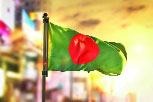Bangladesh’s prospects dim in coming days
Foreign Policy Report
Rabiul Haque : At least two world leaders are happy with the results of the elections held in Bangladesh on January 7. One is of course the Prime Minister of Bangladesh, Sheikh Hasina, who has been elected for the fourth time in a row, and the other is the Prime Minister of India, Narendra Modi. To whom Sheikh Hasina represents a rare friend among the neighbors.
The rest of the world is disheartened, if not disappointed, by this democratic backsliding of Bangladesh. But global disapproval on this issue is relatively mild or mild. In a report on January 18, the international magazine Foreign Policy brought these issues forward.
According to the report, Sheikh Hasina’s ruling party Awami League won 222 out of 298 seats in the Bangladesh parliament. In the 2018 elections, the party won 257 seats. Like many other parties, the main opposition Bangladesh Nationalist Party (BNP) boycotted the election and many BNP leaders and opposition activists were in jail during the election.
Besides, there were so-called dummy candidates on the ballot in several constituencies.
As the whole world is focused on the war in Gaza and Ukraine, Sheikh Hasina may have known that no one will pay much attention to the elections in Bangladesh.
They have faced threats including intimidation of voters. Regional leaders of Awami League have warned people who are dependent on various welfare benefits, including state allowances, that they will lose their benefits if they do not go to vote.
In 2018, political opposition parties participated in the elections and there were contests between credible candidates. But due to widespread electoral fraud – as well as the Awami League’s refusal to hand over government control to a caretaker government – the opposition decided to boycott this year’s vote.
Although the Awami League appears strong, voter turnout in the election was only 40 percent – half of 2018’s voter turnout and the lowest in three decades. Even observers are skeptical of this 40 percent voter turnout figure.
A source, who did not want to be named out of fear of retaliation, said he visited several booths during polling on January 7 and some booths had only a few voters till 2pm. And in some places the turnout was between 5 percent and 10 percent. At 3 p.m., the Election Commission of Bangladesh reported 27 percent voter turnout. And then it increased to 40 percent in the hour before polling closed at 4 pm, said the Election Commission.
Besides, with the approach of election on January 7, Sheikh Hasina’s government continued to suppress the opposition. Just before the election, a local court convicted Mohammad Yunus, Bangladesh’s only Nobel laureate and microfinance promoter, of labor law violations and sentenced him to six months in prison.
Dr. Yunus once joined politics and brought forward the idea of forming a party; Sheikh Hasina called her the ‘bloodsucker of the poor’. Amnesty International’s former secretary-general Irene Khan said the verdict was a “judicial fraud”.
Months before the election, the US imposed visa restrictions on unidentified Bangladeshis. The country said at the time that the visa restrictions were imposed against those responsible for or involved in undermining democracy, including members of law enforcement agencies, ruling parties and opposition parties.
After the vote, held in the first week of January, the US State Department said the election was not free or fair. The US now faces a dilemma moving forward. It must be taken into account that US diplomats have criticized Bangladesh’s elected government leader – even as Washington praises Dhaka’s support for curbing Islamist militancy.
Meanwhile, India’s Modi is probably happy with the results of this election in Bangladesh. It needs regional partners, especially as it faces competition from China. Since the Pulwama attack in 2019 in which more than 40 Indian soldiers were killed, India’s relations with Pakistan have worsened as only war or armed conflict can.
In addition, India’s diplomatic dispute with the Maldives has arisen over Modi’s vacation in an Indian island at the beginning of this year. As a result, Modi’s supporters are more appreciative of India’s beaches than Maldives, but the incident has shifted the Maldives more firmly into China’s camp.
And lastly, the possible failure of an Indian company’s green energy project in Sri Lanka has also cast a shadow over India’s relationship with Colombo.
Rare Israeli airstrike in Beirut kills Hezbollah commander and more than a dozen others
International Desk: Israel launched a rare airstrike that killed a senior Hezbollah milita…








